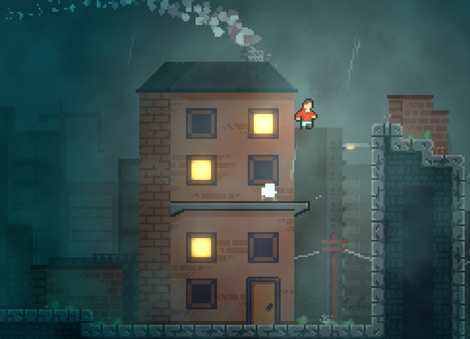More than just a game
The games industry in Saxony-Anhalt has significant potential

For many years, computer games had a bad reputation, but the idea that games are only played by nerds who spend hours on their consoles avoiding social interaction is a thing of the past. For many people, computer and video games are a form of creative entertainment. They combine the analog and the digital worlds and allow processes and products to be re-imagined. In Saxony-Anhalt, the development of games and the spread of digitalization have been given a new impetus.
Barbara Mendes Jenner was not exactly predestined to work with computer games, because there were no electronic toys at home when she was growing up. But the 24-year-old is now a member of a team that is aiming to achieve great things in the world of gaming. Together with six other students, she founded the company Moonlit Monitors almost a year ago to bring a game onto the market that could hardly be more relevant in the light of current events. The game, which is known as Germinal, is all about an epidemic and the fear of bacteria and viruses. When the software engineers and programmers first began developing the game in January 2020, they had no idea how topical it would be. “We started out by wanting to demonstrate how to deal with a phobia of germs, but this is now something that everyone will understand,” says Jenner, who is responsible for narrative design and PR at the start-up and is studying psychology at Otto von Guericke University (OVGU) in Magdeburg.
Bringing the next generation on board early
The newly established company is a good example of what is happening on the market in Saxony-Anhalt. Digitalization is speeding up the pace of creative entrepreneurship and promoting young talent. In some places, even young children are being brought on board. For example, the cultural education scheme in Eisleben and Mansfeld is offering a summer vacation program which gives children the opportunity to design their own adventure games. The boundaries between the disciplines are blurred when it comes to developing and establishing games skills.
Barbara Mendes Jenner is bringing her knowledge of psychology from her university course to the new games company. Most of the members of the group, who met during joint university projects, are focusing on scientific findings. When the company founders made the first step towards independence, the mantra they adopted was, “We want to develop games that are fun.” Away from the world of shooters and big publishers, the game developers from Saxony-Anhalt plan to concentrate on indie games. These independent games, developed at relatively low cost, are becoming increasingly popular, not least because the developers can give their creativity free rein. “Established brands often simply add new parts to games over and over again, but we are focusing on innovative elements,” says Jonas Kießler.
Club at Magdeburg University brings games fans together
Jonas Kießler, 23, is an archetypal creative games developer. Games became part of his life at a very early age. When Jonas’ father gave him his old Nintendo console, Jonas was completely gripped. He began doodling technical details and games ideas on paper. At the age of 11, he created his own level in the Super Mario Bros. game. When he left school, he wanted to study IT and, not without good reason, he chose the university in Magdeburg. “The decisive factor for me was the wide range of activities in this area,” he says. He has now completed his bachelor’s degree and is planning to move to Harz University of Applied Sciences to do a master’s in media and games design.
It was Acagamics in particular that appealed to him straight away. This non-profit club at the OGVU has become well-known over the last 16 years as a platform for students who are interested in developing games. As well as courses and lectures, the club organizes workshops and games jams. The students develop games, work on projects during technical meetups, travel to conferences and visit games studios. One of the club’s main goals is to exploit the potential within the university and increase the acceptance of video games, both in society as a whole and in the academic world, as Sven Timmerman explains. He is also a member of Acagamics and another of the young entrepreneurs who founded Moonlit Monitors. Together they are working to ensure that the games industry is taken more seriously, with support from the Games & XR Mitteldeutschland e. V. association, among others, which is committed to playing an active role in shaping the regional structure of central Germany by creating networking and training opportunities in Saxony, Saxony-Anhalt and Thuringia.
“We need to be able to compete with the whole world.”
Jonas Kießler is also happy to provide support and pass his knowledge on to others. He runs courses for the university club on 3D games and software projects and holds seminars that introduce students to the world of digital gaming. He explains that there is a lot of demand for these activities and it is constantly growing. He believes that this is because of the increasing importance of the industry. The range of technical courses available in Saxony-Anhalt backs this up. For example, the Burg Giebichenstein University of Art and Design in Halle runs a course on games and learning design, while at the Anhalt University of Applied Sciences there are courses such as “Applied IT – digital media and games development,” “Digital media technology” and “Interactive media.” In addition, the term “gamification” is being used much more widely, as Kießler explains. It describes the transfer of elements that are typical of computer games into other areas, such as healthcare and training. The young managing director of Moonlit Monitors covered the subject in his bachelor’s thesis and investigated its use in the education sector. “You can check facts on Google,” he says, “but it’s much more important to encourage people to understand the background behind them.” Ideas like this also form part of the work of Moonlit Monitors.
The team has spent many hours over the last 18 months planning, programming, designing and testing the Germinal game about an epidemic. All of this is funded by the students themselves and, at the moment, the company headquarters only exists on paper. The members of the group come together online or meet in each other’s rooms. They plan to launch the game in early 2022, but no one is under any pressure. “Everything has to be perfect. We need to be able to compete with the whole world,” says Barbara Mendes Jenner. This idea does not worry them. “We’re good at what we do,” she explains. And one other thing is clear. As Jonas Kießler says: “When this takes off, it will be in Saxony-Anhalt. There’s a lot happening here.”
Author: Manuela Bock/IMG Saxony-Anhalt

Companies from Saxony-Anhalt have recognized the potential of games for society and economy and are making more out of games - more ENTERtainment, more EDUtainment, more APITs.
